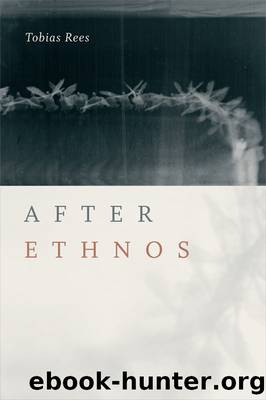After Ethnos by Rees Tobias

Author:Rees, Tobias
Language: eng
Format: epub
Publisher: amazon
THREE
Foucault offers little more than a first, almost clumsy, and in any case insufficient sense of what “the actual” could mean. An opportunity to change this—to broaden and simultaneously refine the concept of the actual I seek to elaborate—I found in the writings of two authors who have never used the term in any conceptual way but in whose works one can hear resound, like one can hear an echo resound, Foucault’s notion of a pure actuality: Gaston Bachelard (1884–1962) and Georges Canguilhem (1904–1995).
What if one exposes Foucault’s notion of the actual in the works of Bachelard and Canguilhem?
A central theme of Bachelard’s work was what he referred to as the “epistemological rupture” that set apart everyday conceptions of the real from the scientifically real.7
Up until the early twentieth century, Bachelard argued—in well over twenty books—that the real was either understood as constructed (Bachelard called this school of thought “idealism”) or as (“materialism”). However, in the early twentieth century, specifically with Einstein’s sketch of the theory of relativity in 1905 and the subsequent formulation of quantum physics, a conception of the real emerged that radically escaped the two established philosophical understandings of the real. Quantum physics, according to Bachelard, produced knowledge not of things as they exist in nature (he spoke of a “continuity of substance”) but of things that were constituted by thought and made material by experiments (his favorite example of what he called “reified theorems” were isotopes produced by the cyclotron and then identified by mass spectrometry). In his words: “The trajectories which allow us to separate the isotopes in the mass spectrometer don’t exist in nature; one has to produce them technically. They are reified theorems.”8
If Bachelard repeatedly stressed that the knowledge of quantum mechanics defied both materialism (primacy of matter) and idealism (primacy of ideas), that was because he was adamant that the history of science was a kind of philosophical effort to document the formation and contemporary state of the human mind: Bachelard considered it his task to ceaselessly map shifts and discontinuities in the conceptual and experimental constitution of the real. This task implied the challenge of rendering visible how the new outgrew the already established and thereby opened up a need for new concepts and modes of understanding.9
Canguilhem, concerned with biology rather than with physics, radicalized and multiplied Bachelard’s rupture concept. Where Bachelard was ultimately concerned with one rupture only—the rupture provoked by the new scientific spirit—Canguilhem argued that discontinuity was a general feature of the growth of biological knowledge.
Progress, for Canguilhem, was possible. However, progress was not a linear process, “a mere increase in volume, achieved by adding new insights to the already known.” Instead, progress came in the form of epistemological ruptures. A new knowledge, according to Canguilhem, is new precisely insofar as it is conceptually incommensurable with the logical coherence that organized previous knowledges. Thus the new will inevitably undermine a taken-for-granted-truth, will transform it into a relic of a time when we did not yet know.10
Consequently, Canguilhem regarded
Download
This site does not store any files on its server. We only index and link to content provided by other sites. Please contact the content providers to delete copyright contents if any and email us, we'll remove relevant links or contents immediately.
| Anthropology | Archaeology |
| Philosophy | Politics & Government |
| Social Sciences | Sociology |
| Women's Studies |
Nudge - Improving Decisions about Health, Wealth, and Happiness by Thaler Sunstein(7689)
The Fire Next Time by James Baldwin(5422)
iGen by Jean M. Twenge(5405)
Adulting by Kelly Williams Brown(4562)
The Sports Rules Book by Human Kinetics(4377)
The Hacking of the American Mind by Robert H. Lustig(4368)
The Ethical Slut by Janet W. Hardy(4240)
Captivate by Vanessa Van Edwards(3835)
Mummy Knew by Lisa James(3682)
In a Sunburned Country by Bill Bryson(3528)
The Worm at the Core by Sheldon Solomon(3483)
Ants Among Elephants by Sujatha Gidla(3458)
The 48 laws of power by Robert Greene & Joost Elffers(3221)
Suicide: A Study in Sociology by Emile Durkheim(3011)
The Slow Fix: Solve Problems, Work Smarter, and Live Better In a World Addicted to Speed by Carl Honore(3001)
The Tipping Point by Malcolm Gladwell(2908)
Humans of New York by Brandon Stanton(2864)
Handbook of Forensic Sociology and Psychology by Stephen J. Morewitz & Mark L. Goldstein(2691)
The Happy Hooker by Xaviera Hollander(2683)
